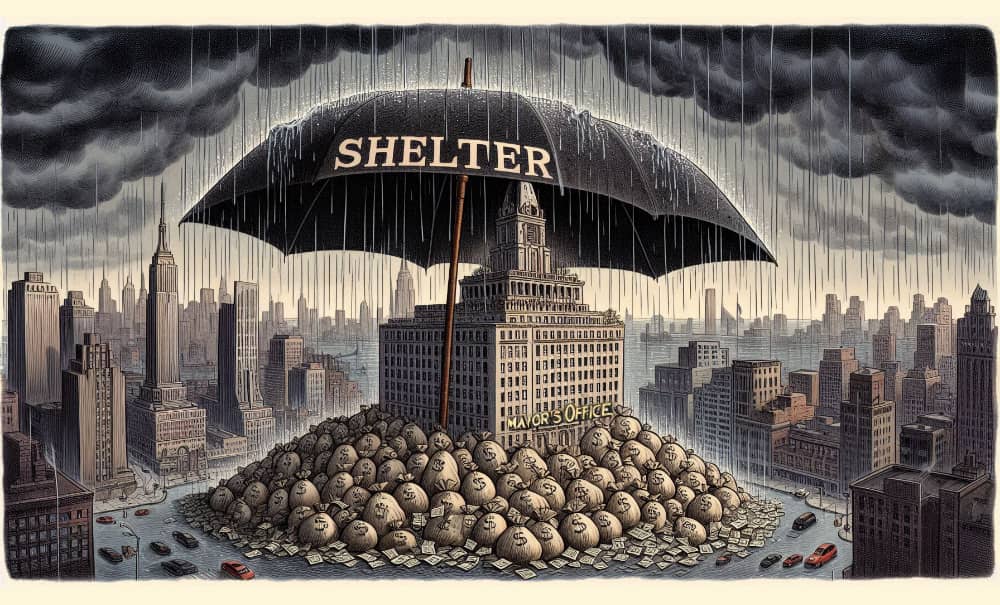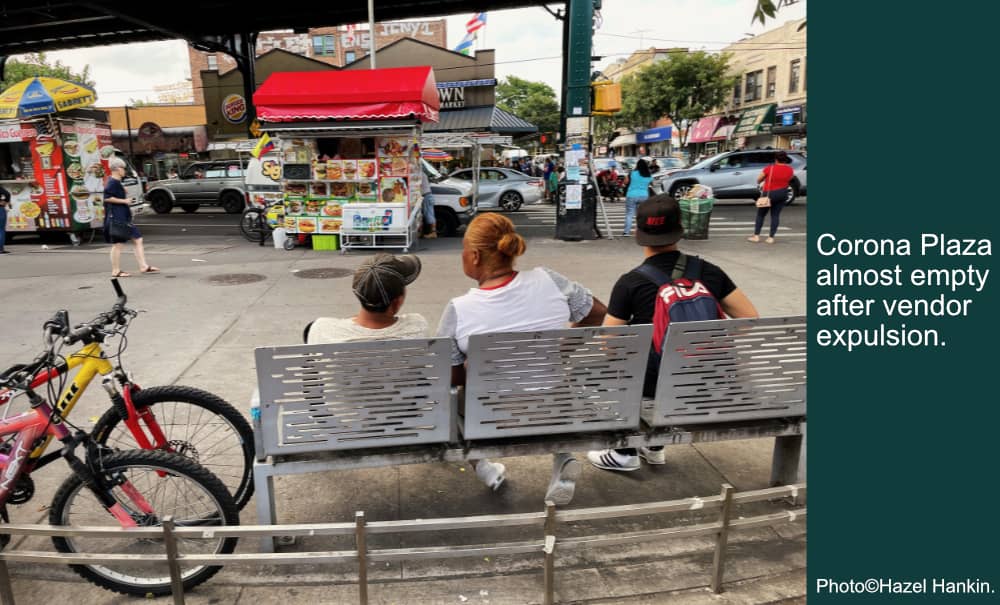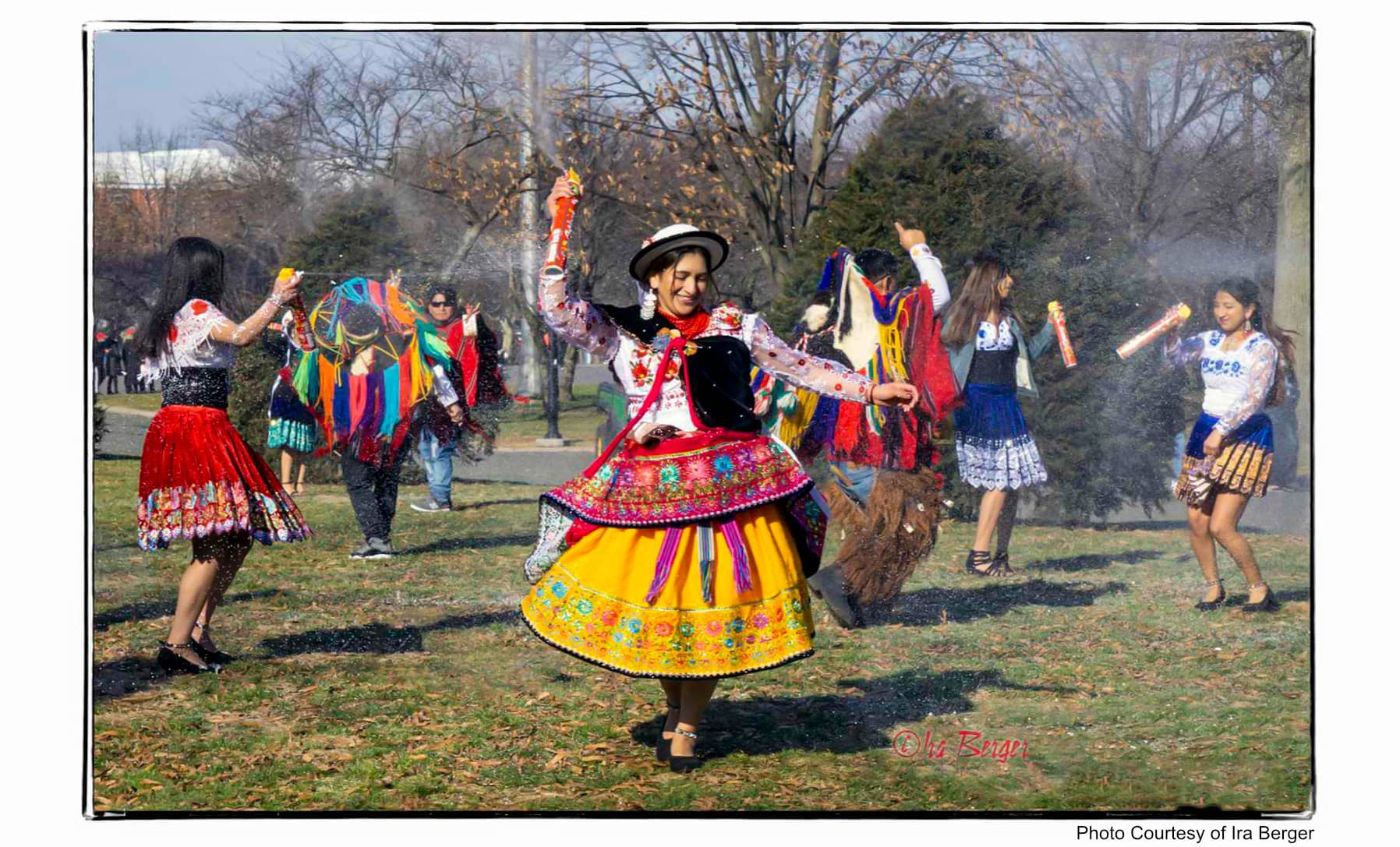
Dear friends,
As the US moves toward a national presidential election, with the straightjacket of a two-party system offering little hope for demilitarized immigration policies or the defunding of Israeli genocide of Palestinian refugees—we go local. Our newsletter looks at the corruption poisoning city contracts for migrant shelter and services, as a part of the deepening scandal that threatens the Mayor’s office and a functional city government. We then report on the deployment of police, troopers, and political theater with the launch of ‘Operation Restore Roosevelt,’ and the fight to create community-based solutions instead of carceral punishment.
Newsletter highlights:
- Using the ‘migrant crisis’ to line pockets of Mayor’s allies
- NYPD and state troopers descend on Roosevelt Avenue
1. City Corruption Blights Migrant Shelter Contracting
It reads a bit like the opening chapter of a bad true crime novel: several senior aides to Mayor Eric Adams have their homes searched and devices seized in an expansive federal investigation; a stunning number of senior staff and City Hall officials then quickly resign. The Mayor himself faces federal bribery charges—but is so far left standing, and hoping we don’t read the rest of the book.
One character in the story who deserves our attention is Timothy Pearson, long-time friend and confidant of Eric Adams (who decades ago served as Adams’ supervisor in the NYPD). Pearson held a lucrative, if ambiguous, position in the Mayor’s administration, tasked, among other things, with overseeing contracts with the city’s migrant shelters, and ‘saving money’ as the costs of sheltering migrant arrivals rose.
By late 2023, both the City Council and City Comptroller Brad Lander had already spotlighted how the city was overpaying for migrant services, hiring staff at sometimes astronomical rates and outside any competitive bidding process. In December, Lander revoked the Mayor’s blanket authority to contract for emergency migrant services, a process blighted by scandal and lack of transparency. Contracts would now require independent prior approval from the Comptroller’s office. Nevertheless, Pearson still maintained leverage over parts of the contracting process. In particular, one organization—the Health and Hospitals Corporation (HHC)—remained outside the new Comptroller oversight, because it is an independently-run public authority and not a city agency.
HHC contracted with an outside company, Cherokee Nation Management & Consulting, to provide case management services to migrants in the shelter system starting January 1, 2024. These essential casework services help migrants get work authorization papers and exit the emergency shelters. Timothy Pearson delayed the HHC contract with Cherokee for three months in early 2024, as the population of migrants housed in NYC shelters rose from 24,000 to 25,000. Pearson has offered no explanation for his lengthy stall of the already-signed contract; we assume the ongoing federal probe will offer some answers. A court filing by a co-worker who accuses Pearson of sexual harassment and retaliation claims that he talked about his desire to personally benefit from his work overseeing shelter contracts. “I have to get mine. Where are my crumbs?” he allegedly said.
Pearson’s interference with case management services for migrants was not the first time he meddled in multi-million dollar contracting protocols. In summer 2023, according to a Politico investigation, Pearson delayed the opening of a migrant facility at Floyd Bennett Field in Brooklyn. His aim: to garner a security contract for his buddy Bo Dietl, former NYPD detective, colleague of Steve Bannon and Roger Ailes of Fox News, and loyal fundraiser for Erik Adams.
Pearson resigned his position in the mayor’s administration as of October 4, citing a need to focus on “self-care and new endeavors.”
While the drama of unfolding corruption may fascinate, the obscenity of a City Hall committed at the highest levels to self-dealing—and on the backs of migrant lives—should also outrage us. And move us toward mutual aid and, hopefully, a new mayor.
WHAT CAN WE DO?
- If you are able, please consider donating to NYC-based groups providing mutual aid or legal services for newly-arrived migrants including African Communities Together and South Bronx Mutual Aid.
2. ‘Operation Restore Roosevelt’ Coming to a Theater Near You
“Mayor Adams and Governor Hochul have decided to launch a quasi-military operation designed to criminalize people just trying to put food on the table and keep a roof over their heads. It is absurd and dangerous for elected officials to scapegoat an entire neighborhood to cover up their own failures of leadership …. [They] talk about New York City as a city of immigrants but yet they put them at risk of deportation every time that they increase policing on the streets. [O]ur leaders have made a cynical play for headlines at the expense of a population that has already disproportionately borne the brunt of police violence.” –Make the Road NY (October 2024)
So now we have “Operation Restore Roosevelt,” press conference photo ops, and political posturing by Mayor Adams and Democratic District Leader Hiram Monserrate. The mayor needs to take the focus off his administration’s scandals, and Monserrate is running for office yet again. So, the fallback position is to send in the cops for 90 days and pacify the locals.
Let’s see what’s really going on here. Hiram Monserrate has a checkered history in Queens politics and is an unlikely person to be concerned about morality. He was expelled from the state Senate in 2010 after being convicted of domestic assault and later served time in prison for mail fraud. For years, he ran unsuccessfully for various state and city offices, but finally was elected Democratic District Leader in 2018. It is from that office that he organized rallies in early October on Roosevelt Avenue at 90th Street “to save the neighborhood” and capture Gov. Hochul’s attention.
This new operation with state troopers and NYPD will focus on Roosevelt from 74th Street to 111th Street over the next 90 days and will see city agencies target brothels and illegal vending. The operation claims it will help women the city said are victims of sex trafficking, forced into prostitution.
This is not the first time for increased enforcement. Back in January there was a big push to close down brothels; and in April, City Council Member Francisco Moya relaunched the Roosevelt Avenue Task Force (first created in 1991) focusing on street vendors.
State Senator Ramos, quoted in the Queens Daily Eagle, commented:
“It seems like everything else he [Adams] does, a photo op. I think the mayor feels like he’s up against the wall, and he falls back to what he knows–performance policing …. There’s been traffickers along Roosevelt Avenue for nearly all of the 40 years of my life that I have known, and that I have seen. [The mayor] could have started an operation to help the women being trafficked and exploited years ago, when he first took office.”
Queens Borough President Donovan Richards added, “I thought we had a task force. I’m trying to understand why all of a sudden they’re beefing up police presence.”
Make The Road NY and the Street Vendor Project issued a strong statement on Instagram condemning this criminalization of our Queens neighborhood. City Councilman Shekar Krishnan has put forward two bills to address alleged human trafficking and forced prostitution throughout the city.
On October 22, a coalition of groups including Decrim New York and MRNY hosted a rally in Corona Plaza opposing Operation Restore Roosevelt, claiming that it targets the vulnerable, including immigrants, transgender people, and sex workers. Speakers denounced the flood of cops now in central Queens, saying the operation is displacing street vendors who are afraid to work in the face of heavy police presence. When disgraced former State Senator Monserrate showed up, he was chased out of the Plaza by defiant transgender sex workers and their allies chanting “More resources, not more raids!”
WHAT CAN WE DO?
- If you are able, please consider supporting the Street Vendor Project or Make the Road NY.
In solidarity and with collective care,
Jackson Heights Immigrant Solidarity Network (JHISN)
Follow @JHSolidarity on Facebook and Twitter and share this newsletter with friends, families, neighbors, networks, and colleagues so they can subscribe and receive news from JHISN.

